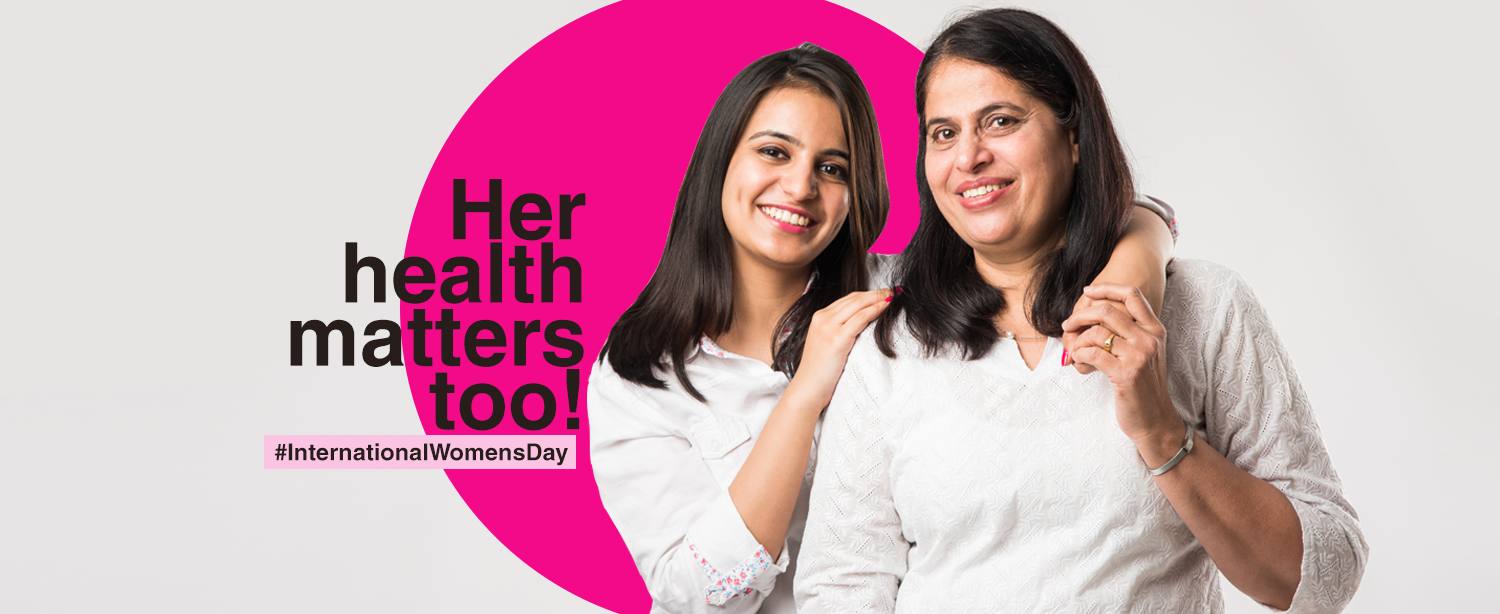Despite making up half of the world’s population, women face major bias when it comes to healthcare. Most women don’t get timely access to healthcare services. A research conducted by a well known medical institute in India found only 37% of women got access to health care, as compared to 67% of men. Many of today’s health problems are preventable and manageable, as long as the appropriate time and care are given. It is time to increase the awareness about women’s diseases and ensure they get equal access to medical care. Women themselves must also make their health a priority and take the time to address their health concerns.
Common Women’s Diseases
Here is a list of the most common health disorders suffered by women:
1. Breast Cancer
Breast cancer is the most common form of cancer found in women. The earlier breast cancer is detected, the more treatable it is, so it’s important that women over the age of 40 years must do regular self-checks and mammograms. Here are the common risk factors of breast cancer:
- Genes such as BRCA1 and BRCA2.
- Family history of breast cancer.
- Early onset of menstruation (before age 12) or menopause.
- Smoking or excessive alcohol intake.
- Obesity.
2. Osteoporosis
Women have a lower bone density than men and they tend to lose bone mass more rapidly as they age, this can lead to osteoporosis. Like many other common health issues for women, osteoporosis is influenced by the hormone estrogen. Estrogen helps regulate your reproductive cycle and keeps your bones strong. Because women experience dramatic drops in estrogen with menopause, they’re more likely to experience bone loss and osteoporosis at that time.
Here are a few health tips for stronger bones:
- Ensuring adequate calcium intake.
- Maintaining proper vitamin D levels.
- Be regular with your exercise routine.
- Avoid aerated drinks.
- Reducing your intake of salt.
3. Heart Disease
Although heart disease is often thought of as a problem that mainly affects men, heart disease is the most common cause of death for both men and women. Women experience different symptoms of a heart attack as compared to men. Here are a few symptoms:
- Neck, jaw, shoulder, upper back or abdominal pain.
- Shortness of breath.
- Pain in one or both arms.
- Nausea or vomiting.
- Sweating.
4. Depression
More women are diagnosed with depression, compared with men, with one in five experiencing depression at some time in their life. Women are more likely to experience these conditions during pregnancy and postpartum. Here are a few symptoms to watch for:
- An ongoing sad and anxious mood.
- Loss of interest or pleasure in activities.
- Irritability, restlessness or persistent crying.
- Feelings of worthlessness and hopelessness.
- Sleeping problems – oversleeping or insomnia.
5. Fertility issues
10% of women between the ages of 15 and 44 have struggled with getting pregnant and/or staying pregnant. Some of the underlying reasons why women may be having issues with fertility are endometriosis, uterine fibroids, dysmenorrhea and polycystic ovary syndrome (PCOS).
6. Cervical Cancer
Cervical cancer is cancer arising from the cervix. It is due to the abnormal growth of cells that can invade or spread to other parts of the body. Early on, typically no symptoms are seen. Later symptoms may include abnormal vaginal bleeding, pelvic pain or pain during sexual intercourse.
7. Pregnancy issues
Certain complications during pregnancy can threaten the health of a mother and her child. Asthma, diabetes, hypertension, and depression can harm the mother and child during pregnancy if not managed properly.
8. Autoimmune Diseases
Autoimmune disease occurs when body cells that eliminate threats, such as viruses, attack healthy cells. Common autoimmune disease seen in women includes psoriasis, lupus, rheumatoid arthritis, thyroid disorders.
Recommended health tests for women
Women’s bodies go through a lot of hormonal imbalance during their life. Make regular health screenings a part of your life. Being proactive regarding your health can prevent several health problems. We highly recommend these health tests for women:
1. Breast Examination
It is recommended to start your mammograms once you cross 40 years. Early detection ensures better chances of recovery. Complete self breast self-examination is also recommended every month. Talk to your doctor if you spot anything unusual.
2. Pelvic examination
It is always advisable that you visit your Gynaecologist periodically and have a complete pelvic examination and a Pap smear test. Cervical cancer is a leading cause of death amongst women in India.
3. Bone density test
A Bone Density Test helps detect your bone condition. This helps detect osteoporosis.
4. Thyroid test
Many women complain of unexplained weight gain, hair loss, brittle nails, and exhaustion. A common reason for this is an underactive thyroid or hypothyroidism which controls the metabolism of the body. Get your thyroid levels checked.
5. Vitamin D test
This is a vital nutrient needed for bone growth and maintenance. The most important source of vitamin D is exposure to the sun. As we age, the tendency to synthesise this nutrient decreases.
6. Lipid profile tests
This test checks for good and bad cholesterol along with triglycerides and total cholesterol levels. Cholesterol is a fat molecule, which is present in higher levels can get accumulated in the blood vessels and can affect the health of your heart, blood vessels, and brain.
7. Blood sugar test
A blood sugar test helps to diagnose diabetes and pre-diabetes. Diabetes has a tremendous impact on a woman’s health and has severe long-term complications.
8. Cardiac check-up
Get your cardiac check-up done if you have a family history of hypertension, heart disease or if you’re overweight, or if you are a smoker.
This International Women’s Day be proactive about your health. Consult experts when in doubt, do not rely on home remedies and self-medication. Please find below link to our Departments which specialize in women’s healthcare:
https://www.kokilabenhospital.com/departments/centresofexcellence/centrefor_motherchild.html
https://www.kokilabenhospital.com/departments/centresofexcellence/centrefor_cancer.html
https://www.kokilabenhospital.com/departments/clinicaldepartments/gynaecologyobstetrics.html


